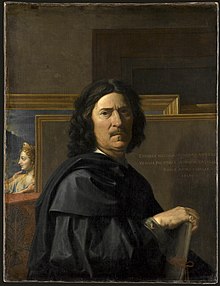Poussin
| Nicolas Poussin | |
|---|---|

Self portrait by Nicolas Poussin, 1650
|
|
| Born |
June 1594 near Les Andelys, Normandy, Kingdom of France (now France) |
| Died | 19 November 1665 (aged 71) Rome, Papal States (now Italy) |
| Nationality | French |
| Known for | Painting |
| Notable work | Et in Arcadia ego, 1637–38 |
| Movement |
Classicism Baroque |
Nicolas Poussin (French: [nikɔlɑ pusɛ̃]; June 1594 – 19 November 1665) was the leading painter of the classical French Baroque style, although he spent most of his working life in Rome. His work is characterized by clarity, logic, and order, and favors line over color. Until the 20th century he remained a major inspiration for such classically oriented artists as Jacques-Louis David, Jean-Auguste-Dominique Ingres and Paul Cézanne.
He worked in Rome for a circle of leading collectors from there and elsewhere, except for a short period when Cardinal Richelieu ordered him back to France to serve as First Painter to the King. Most of his works are history paintings of religious or mythological subjects that very often have a large landscape element.
Nicolas Poussin's early biographer was his friend Giovanni Pietro Bellori, who relates that Poussin was born near Les Andelys in Normandy and that he received an education that included some Latin, which would stand him in good stead. Early sketches attracted the notice of Quentin Varin, a local painter, whose pupil Poussin became, until he ran away to Paris at the age of eighteen. There he entered the studios of the Flemish painter Ferdinand Elle and then of Georges Lallemand, both minor masters now remembered for having tutored Poussin. He found French art in a stage of transition: the old apprenticeship system was disturbed, and the academic training destined to supplant it was not yet established by Simon Vouet. In Paris, Poussin was impressed by Italian art he viewed in the royal collection, and studied engravings after Raphael and Giulio Romano.
...
Wikipedia
